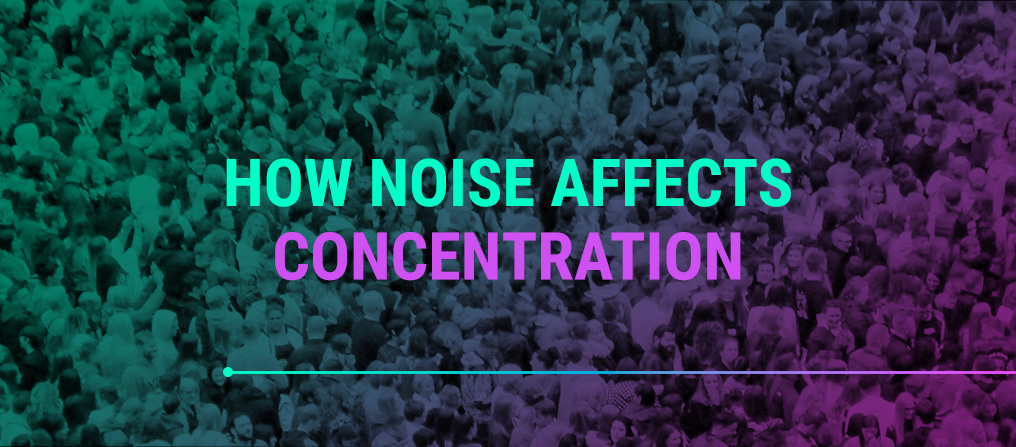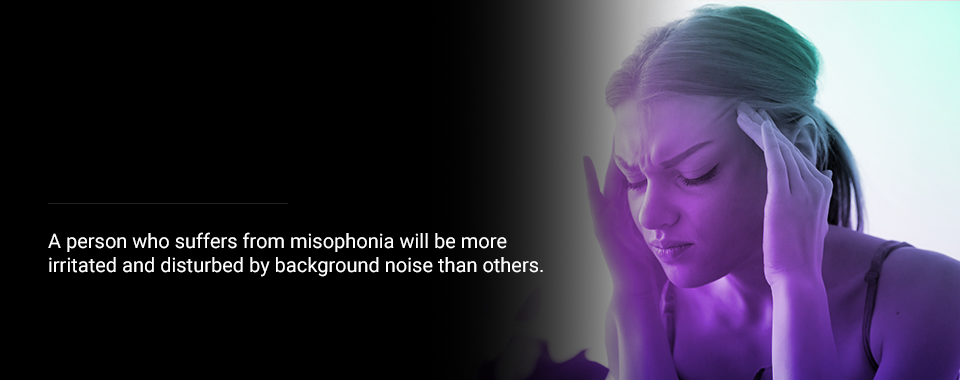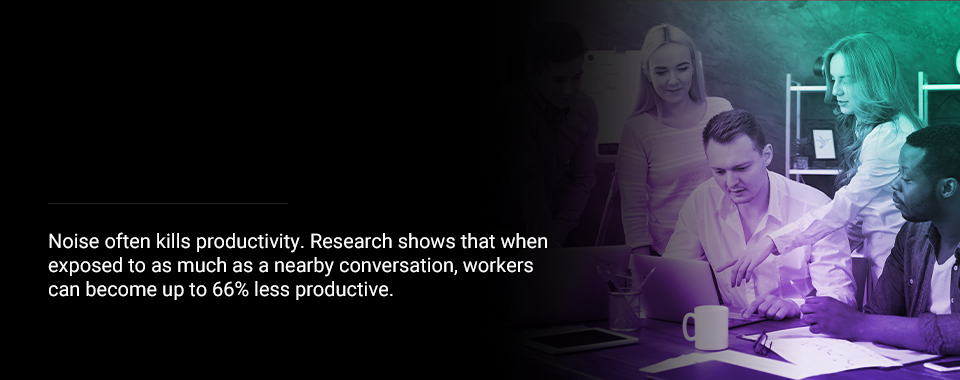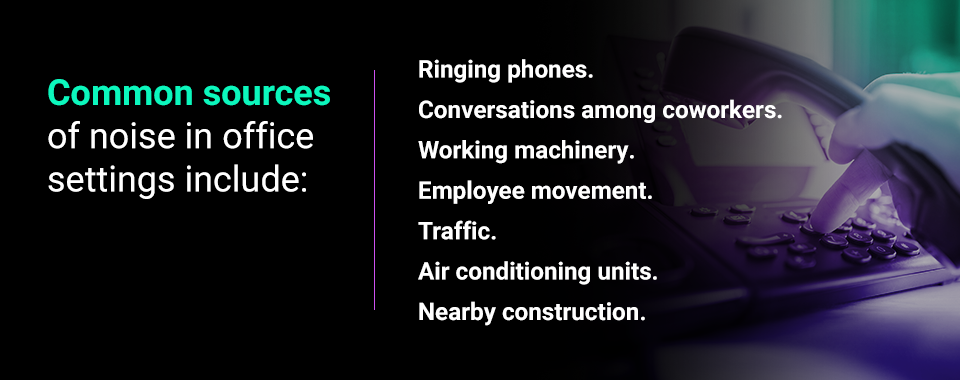

Surrounding noise may be having a larger effect on your productivity than you may realize. According to Scientific America, noise affects brain activity, learning, memory and concentration levels. If prolonged, this influence can translate to reduced performance in the office, poor memory and difficulty in learning in schools, and increased accidents in the workplace.
You may have a problem with noise pollution if your organization has an open-plan office structure. Also, if you work with many people, you may experience noise and its negative effects.
Ambient noise can influence how you learn and how your brain processes tasks. By learning how different people react to background noise and how you can manage noise in your premises, you can increase your productivity.
In this article, we will lay out everything you need to know about the influence of noise on performance and concentration. We also provide eight techniques you can apply to manage noise and reduce its negative influence on work. These methods of noise management range from integrating simple office hacks — like using noise-canceling headphones — to consulting acoustics and noise management experts.
Noise can come from many different sources, especially in an open-plan office. Some common sounds include:

These noises, and any others you may experience, affect concentration due to how the human brain processes sound. Your brain does not rest — even while you sleep — and your ears are always open. As a result, your ear is constantly collecting sounds from the environment and feeding them to your brain.
Meanwhile, your brain searches for patterns that are familiar so it can call your consciousness to it. This occurrence is why you look up from your desk when someone calls your name or you notice your phone ringing even in a busy location.
This tendency for your brain to always listen means that your attention is divided in a noisy place — even when you try to focus — between the task you have at hand and the random sounds and conversations going on. Your brain is constantly on the watch for recognizable sound patterns to amplify and bring to your attention. The effect of noise on learning, working and other tasks is due to this recognition.
It is important to note that noise affects people differently, regardless of the source. For example, there are people who can tolerate sound above 60 decibels (dB), which is how loud a normal conversation is. On the other hand, there are individuals who get easily irritated by sound levels that others find normal.
How ambient noise affects concentration and brain focus depends on a number of factors, such as:
There are some cases where people are affected negatively by background noise due to a mental condition. For instance, some people suffer from misophonia. This condition makes an individual irritated or disgusted by certain trigger sounds made by other human beings. These sounds include chewing or whistling. A person who suffers from misophonia will be more irritated and disturbed by background noise than others.

Another factor can be how neurotic you are. Neurotic people are more prone to feeling negative emotions like depression, anxiety and anger. Because of their predisposition to irritation, these individuals may be more affected by background noise than others.
Also, the amount of control you have over your impulses — known as your inhibitory control — determines how easily you are affected by background noise around you.
In general, background noise affects introverts more than extroverts.
Here’s the simple reason why — extroverts are generally understimulated. Therefore, if you are an extrovert, it may take a considerably high level of noise to arouse your auditory system to the point of irritation, lack of concentration or stress. On the other hand, introverts are easily overstimulated, so noises above 60 dB may easily arouse and irritate you as an introvert.
As a result, ambient noise affects the concentration of introverts more than it affects extroverts. And in an office, there will be different reactions to background noise based on whether the majority of your employees are extroverts or introverts.
Some people enjoy studying and working with music. They believe that, because it consists of familiar sounds and blocks out external noise, music makes them more effective. There are also individuals who use music as a form of intentional distraction from work. As a result, the type of noise present also affects how you respond to it.
Continuous, intermittent, impulsive and low-frequency noises affect your concentration levels differently. For instance, you may react more strongly to noise from indistinct office chatter than you would to white noise or humming machinery.
These contrasting reactions are due to the different decibel levels and the content of the sounds. You may be more distracted by office chatter than a humming printer because the conversations of your coworkers contain recognizable sounds that your brain brings to your attention.
The noise’s content can determine the level of influence it has on your concentration. The sound may comprise normal human communication, white noise, or background sounds from printing machines, keyboards or doors. The type of sounds, and if there are words present, affect how distracting they are
This occurrence is because many people think in words while they’re working, especially on highly cognitive tasks like solving a math problem. The presence of background noise means your brain has to listen to your thoughts to help make sense of the task at hand as well as the background noise. When the noise contains words, you may have an even harder time focusing because it disrupts your inner dialogue.
Background noise can affect some tasks more than others.
One 2021 study found that, in the presence of mostly comprehensible background noise, participants were better able to accurately perform memory-related tasks, like remembering information, than tasks that required switching their attention between two different things. In your own experience, you might find that you’re more frustrated by background noise than your colleagues or vice versa, depending on the type of work you do.
Knowing how noise affects your performance, health and learning can help you understand how to enhance your productivity. For instance, you may think that continued exposure to loud noises will result in habituation, or becoming used to it, when it can lead to more damage instead.
In general, whether you’re misophonic, introverted, extroverted or highly neurotic, research has revealed that everyone’s at their best in total silence. Noise can negatively affect your brain function and concentration and, in extension, your productivity.

Whether in an office or school or on any premises where work is done and concentration is needed, noise affects people in different ways.
Since the 1980s, the open-office plan has become increasingly popular – experts estimate that 70% of offices currently follow an open floor plan, and this trend will likely continue well into the future. Open offices were intended to boost collaboration, access and serendipity. The reality, however, is that open and flexible office plans reduce collaboration and increase distraction and unproductivity.
Beyond affecting your concentration, noise can also impact your productivity and happiness. Here are eight ways noise can negatively affect you and your organization:
Like pushy bosses, excess workloads, upcoming deadlines or toxic work environments, noise can also lead to a high stress level.
According to studies, prolonged and intermittent exposure to loud noise can lead to an increase in the inhibition of stress hormones, resulting in high blood pressure and a fast heart rate. To clarify, background noise refers to more than just unfamiliar noise or office chatter – it also includes conversations that you can hear and understand.
In critical cases and in prolonged exposure, noise can also lead to hypertension.
Noise often kills productivity. Research shows that when exposed to as much as a nearby conversation, workers can become up to 66% less productive.

In an open-plan office setting, where every conversation is within earshot, your business’s productivity levels may be worse. For example, a study funded by Harvard Business School found that offices with open floor plans experienced a significant drop in face-to-face interaction between employees, which in turn led to decreased overall productivity.
Productivity of workers in open floor offices that lack demarcations can be at ground level if non-existent.
Every nearby conversation is a distraction for the part of your brain that controls thinking and completing complex tasks. Tuning these conversations out takes a significant degree of mental effort, which wastes thousands of hours on a yearly basis. In monetary terms, this lack of focus translates to millions of dollars in productive work lost every year.
Because your ears are always open, you must listen to background noises and other employees’ conversations in open office settings even if you don’t want to.
The type of noise doesn’t really matter. Whether it’s unpleasant chatter or music that you love, background noise affects your focus. This distraction greatly divides your bandwidth for concentration and your ability to focus on your work and internal thoughts.
Every noise you hear, from nearby conversations to phone notifications, takes part of what is known as your mental bandwidth and leaves the rest for you to use to listen to your inner thoughts — which you need to get work done. Your conversation bandwidth is limited, so the more noise you listen to, the more your concentration and ability to articulate your thoughts to get useful work done decreases.
Prolonged exposure to noise can increase turnaround time in the office and make completing a simple task seem like running a marathon at the end of the day.
Noise can make work more tiring because it increases general stress levels and the release of stress hormones that affect your blood pressure and heart rate. Spikes in cardiovascular activity lead to an increase in metabolic activities, which can cause you to feel drained and tired.
Additionally, due to the constant presence of distractions, you’ll need to put more time and effort into completing tasks – you may experience decreases in work output thanks to background noise, and your increased mental stimulation might lead to higher levels of fatigue by the end of the workday.
In addition to affecting concentration, loud music can affect your hearing. Prolonged exposure to loud ambient noise can harm your hearing, especially when it’s concentrated through earbuds and headphones. While using headphones can be a way to escape background noise, they bring delicate nerve tissues like your cochlea in close contact to loud music that can destroy the sensitive hairs that help transmit messages to your brain. This contact can lead to hearing loss.

The interesting part is the music doesn’t have to be loud to result in hearing loss. Even noise levels above the 70 dB level have the capacity to affect your hearing.
So, by managing noise and working using music, you may end up creating more problems in the form of hearing loss that can impair your ability to communicate and cause high healthcare costs.
In a busy and noisy office, you may subconsciously bend forward into your desk to shift away from the noise. If done for a long time, this position can alter your bone structure and affect your body posture like in a study concerning saleswomen, possibly leading to musculoskeletal disorders that may negatively affect how you stand, sit and walk. In the long run, this poor posture can lead to increased healthcare costs.
Making sense of instructions in a noisy environment can be difficult. Also, in a study about how sound affects reaction time, the researchers concluded that background noise reduces reaction time and response to instructions. This reduction in these areas can lead to poor communication in the workplace, which may result in accidents.
As you can see, noise may result in reduced concentration, hearing loss, poor performance, accidents in the workplace, etc. Putting everything together reveals that noise is more than a vocal problem – it can become a financial problem when left unaddressed.
Noisy environments translate to lost working hours and healthcare costs that cut deep into your bottom line and revenue. Therefore, a noisy environment is detrimental to your employees as well as your business revenue and profitability.
In the end, no matter the nature of the noise or your personality, mental state or job, background noise affects your concentration as well as other areas of your life and work.
Now that you know the effects noise can have, it’s important to understand how you can manage noise in the workplace and help to reduce the negative influence it has on concentration and productivity.
Here are eight techniques you can use to manage unwanted sound:
The first step in solving the problem of noise pollution is to identify the source of the noise. You can figure out the origin of noise on your premises by creating an acoustic profile to understand where the different sounds come from and their contribution to the noise you experience.

Common sources of noise in office settings include:
Your first task is to identify the source of the noise so you can figure out the best way to manage the noise and boost concentration.
Some floor materials are sound amplifiers while others are sound absorbers. The right flooring can be your first front of attack against noise pollution in your workplace, especially if your job requires a lot of movement.
For example, concrete, ceramic and porcelain floors are natural sound amplifiers. On the other hand, carpets and engineered hardwood are good flooring alternatives to help reduce noise in the workplace.

Luxury vinyl tile (LVT) flooring is another great alternative to help reduce sound due to its sound-absorbing quality. By changing your floor, you can significantly reduce noises that may distract you or other workers. If you need help choosing the best flooring for your building, can speak with a flooring or sound expert to help you make the best decision.
The kind of furniture you use also plays a major role in the acoustic profile of your workplace. Try to choose furniture that absorbs and localizes sound. These options will help control and reduce distracting background noise.
Cubicles and wall partitions can help reduce the number of distracting noises that are common in an open-plan office. This method helps to reduce disturbances and interruptions among team members.
If you still find noises distracting you and making you unproductive, a pair of noise-canceling headphones can help. These items enable you to focus on the work at hand and block off any background noise that would usually agitate you.
Noise-canceling headphones actively cancel out ambient noise by producing inverse soundwaves within your ear. This feature is especially helpful for environments with lots of low-frequency background noise, like quiet chatter or clacking keyboards. While some models are more effective than others, busy office workers will find that a good pair of noise-canceling or noise-isolating headphones are well worth the investment.
While some tasks may require complete silence, you can use ambient music to cover noises that bother you in the workplace. Music and sounds without words, such as waterfalls, white noise or classical compositions, work well for this purpose. By using these sounds correctly, you can mask distracting background noise by replacing it with more pleasing options.
Beyond improving the air quality and aesthetics in the workplace, plants are proven noise reducers. However, simply standing a flower at the corner of your office may not provide the needed results. To get the noise reduction effect, you should consider planting and maintaining a plant wall. The more plants you install in your workplace, the better the noise reduction effect.

You can use your office configuration to control noise, as well. For example, you can arrange furniture in ways that help localize noise levels and prevent distracting sounds from traveling through your office.
If you run a large office, you can install acoustic wall panels in strategic locations to manage noise. Consulting an expert can help you make the best decisions when it comes to using the most appropriate acoustic wall panels for your workplace.
You can also install noise insulation materials in your office to help control and reduce sound.
Now you know how noise affects the brain, breaks concentration and affects focus. For schools and offices, distracting sounds can lead to reduced cognitive performance and productivity. For worship centers, entertainment and resort location, noise can negatively affect guests’ experience. By reducing the effect of noise on your operations, you can enhance your business revenue.

Combating noise pollution starts with identifying the source, which will help you develop and deploy the right noise management techniques. Consulting an acoustics expert like Illuminated Integration can help you make the best noise control decisions for your organization.
At Illuminated Integration, we provide expert acoustic consultation, design and installation for a variety of locations to help improve focus and performance and reduce the negative influence of noise on brain activity.
Have any questions or need help with managing noise on your premises? Contact us today to discuss your acoustic needs.